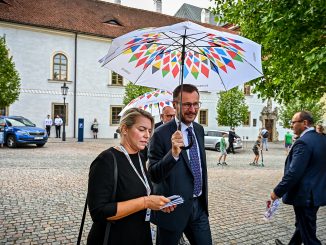
Here we republish the joint statement, signed by 125 organisations, on the withdrawal of the proposal for the Sustainable Use Regulation (SUR), the implications of this move, and what these organisations want to happen now. PDF of the letter, with references and names of all organisations, available below.
We, the undersigned organisations, condemn the failure of the European Parliament, Council and Commission to deliver on a crucial element of the Green Deal: pesticide reduction. On February 6th 2024 the European Commission announced it would withdraw its proposal for the Sustainable Use Regulation (SUR), delaying by years urgently needed action to reduce the use and risks of synthetic pesticides in Europe.
By failing to adopt an ambitious pesticide reduction law, the EU institutions betray more than a million citizens across Europe who expressed the pressing need to reduce pesticides, and to support farmers in doing so, through the ECI Save Bees and Farmers. Their demands deserve an answer, the next generations as well. Instead, what citizens have received is increased health and environmental risks and no commitment to sustainability, thus undermining the credibility of EU institutions.
The Commission decision to withdraw the SUR should not be presented as a ‘gift’ to farmers. It will only keep them trapped into the pesticide merry-go-round, further locking farming in unsustainable practices that impact farmers’ health, that of workers and citizens. Right from the outset, it was the pesticide and wider agribusiness industry – corporations that make big profits on the backs of farmers – who launched attacks on the Green Deal, Farm to Fork and Biodiversity Strategy.
The farmers’ mobilisations taking place across Europe require answers that address the root causes of their low income and lack of prospects. Backtracking on environmental ambition is not the solution. On the contrary: if the climate and biodiversity crisis are not addressed, the challenges faced by farmers will only worsen.
For decades, scientists have warned about the detrimental impact of pesticides. There is increasing scientific evidence linking exposure to synthetic pesticides to severe illnesses like cancer and Parkinson’s disease, with farmers and farm workers being the first affected. Last year, over 6000 scientists raised the alarm on the impact of pesticides on biodiversity and the crucial need of a strong regulation to drastically reduce the use of pesticides to ensure our long term food security.
Producing food with less, if any, pesticides is possible, necessary and desirable for all in society. Extensive research and empirical data across Europe demonstrate the potential of Integrated Pest Management (IPM) and agroecological practices to reduce reliance on pesticide, while increasing the overall resilience of agricultural systems and reinforcing the financial sustainability of farms. Although IPM has been mandatory since 2014, implementation has been lacking, due to the absence of a robust, binding and supportive framework. The SUR proposal aimed to tackle these shortcomings.
Instead of embracing profit-guided tools promoted by the agroindustry, like pesticides and genetically modified organisms, EU policies must focus on supporting farmers in shifting towards environmentally and socially sustainable agricultural models, such as organic and agroecological farming. The push for the deregulation of GMOs will only perpetuate an agricultural model that depends on synthetic pesticides and contribute to the heightened dependence of farmers on large corporations via patented seeds. In contrast, it is crucial for the EU to acknowledge, protect, and universally promote farmers’ traditional knowledge and know-how, and implement non-chemical alternatives to synthetic pesticides.
Supporting farmers in the transition also means tackling the decades of policies that have led to this situation, with farmers being pushed to produce ever-more, ever-cheaper food. This has amounted to large profit margins for agribusiness but at great societal costs. The EU must ensure fair prices and a decent standard of living for farmers and farm workers, and protect their livelihoods. The reduction in pesticide use must also be accompanied by strong trade regulations that prevent unfair competition from products that do not respect EU rules. It is also high time for the EU to ban the production and exportation of pesticides which cannot legally be used on EU land.
We call on the European Commission to keep the focus on the real issues faced by farmers, including fair incomes, while accelerating the transition towards resilient food systems not dependent on synthetic pesticides, and ensuring access to safe and nutritious food for all. An ambitious regulation at the European level for reducing pesticide use, aligned with the Farm to Fork objectives and the post-2020 Global Biodiversity targets, is urgently needed to make this transition possible, and must remain a priority of the next EU mandate.
Read the Joint-Statement-The-EU-must-make-pesticide-reduction-a-reality
EU and International Organisations
Agroecology Europe
BeeLife
Birdlife
Child Rights International Network (CRIN) Corporate Europe Observatory
Euro Coop European Coordination
Via Campesina (ECVC)
European Federation of Food, Agriculture and Tourism Trade Unions (EFFAT)
Fair Trade Advocacy Office Foodwatch International Friends of the Earth Europe
IFOAM Organics Europe Institute for Agriculture and Trade Policy (IATP)
Justice Pesticides
PAN Europe
SAFE Food Advocacy Europe
Slow Food International
Urgenci International
Community Supported Agriculture Network
Women Engage for a Common Future (WECF)
Full list of all national organisations available at the Joint-Statement-The-EU-must-make-pesticide-reduction-a-reality

More on Pesticides
Commission to scrap EU pesticide reduction plan amid presSURe from farmers
More from Brussels
Simply Slashing the CAP – Commission Proposes Rollback on Rules
EPP’s Von der Leyen Launches Second Term Bid without Mentioning Farmers – Once.
European Farmers are Angry: Addressing Root Causes Would Overcome Polarisation
Brussels Round up – Mirror Clauses, Mixed Messages & Farm to Facts
Parliament greenlights plans to loosen EU rules on new GMOs – but with key conditions




